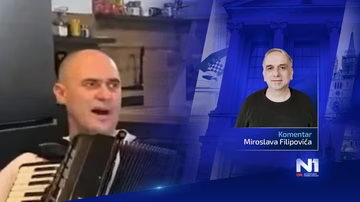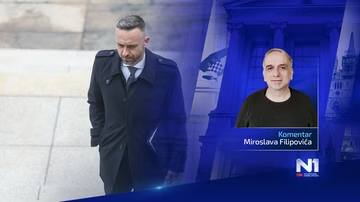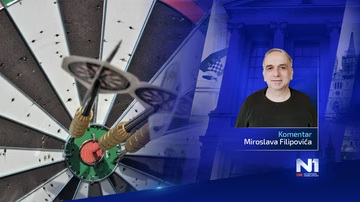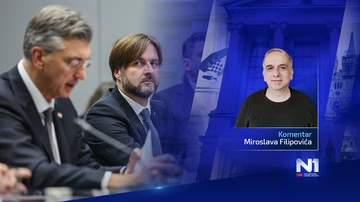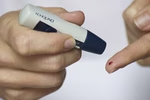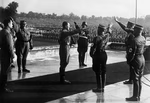
The report by the Centre for Information Resilience (CIR), which suggests a strong influence of pro-Russian bots on the Croatian presidential election, contains flaws that cast doubt on its quality and is poorly prepared, according to the GONG NGO and IT expert Marko Rakar.
"Regarding the newly published report from the Centre for Information Resilience (CIR), which highlights the existence of a coordinated network of pro-Russian fake profiles supporting Zoran Milanovic, GONG believes that the published analysis has certain flaws that raise doubts about its quality and the systematic nature of its research methods," GONG said in a response to a question from the Croatian News Agency (Hina).
According to the CIR report, pro-Russian networks were active in two cases - after the current president's victory in the first round of the election and before, after his statements against possible Croatian involvement in the Russian-Ukrainian war.
These networks systematically praise President Milanovic and promote content that supports his views. At the same time, they spread messages against the European Union and NATO, which are directed against Milanovic's opponent Dragan Primorac, according to CIR.
The CIR report also mentions that a comprehensive analysis of the portals and social networks of the two presidential candidates (Facebook, X, Telegram, Reddit, TikTok) was conducted from 4 December 2024 to 4 January 2025.
GONG: Methodology insufficiently explained
"However, the investigation does not mention the bots from Dragan Primorac's TikTok accounts that the network had identified and removed. This information was already publicly available at the time the network was analysed. In other words, it is unclear how the investigation missed the 7,500 bots that were removed by TikTok before the first round of the presidential election, as reported by numerous media outlets," GONG emphasises.
The NGO also points out that the CIR investigation is anonymous and the methodology is insufficiently explained.
"There is no evidence that this was a coordinated and organised bot operation, which was a key issue with the fake profiles Meta removed from HDZ's Facebook account," GONG notes, referring to the parliamentary election last April, when Meta confirmed and linked over 150 fake profiles of HDZ Youth members, which were then removed.
Another problem identified in the CIR report, according to GONG, is the selective choice of examples used to draw generalised conclusions.
"For example, Darko Lesinger's X account is mentioned in the analysis as being characterised by bot activity and is claimed to be based in Zagreb. However, Darko Lesinger is a real person, a journalist and photographer from Zagreb, which is publicly known," says GONG.
Furthermore, the information that Maxportal, an alternative Croatian media organisation that has published misinformation about the war in Ukraine in the past, supports Zoran Milanovic is not correct.
"If you check their posts on Facebook, you will find that Maxportal criticises Milanovic and calls him a 'communist' and shares HDZ party's statements urging voters to support Dragan Primorac," says GONG.
The initiative for the publication of the CIR report came from Croatia, from researchers who wished to remain anonymous, GONG claims.
"This raises doubts that the investigation is not independent, even though attempts were initially made to present it as such. GONG has requested further clarification from CIR on the methodology of this investigation as well as more information from the digital platforms on their findings on the actions of the aforementioned network of fake profiles," the NGO said.
Rakar: CIR has not previously engaged with Europe in this way
IT systems expert Marko Rakar says that CIR is an authentic organisation, but according to its reports, it has not previously engaged with Europe in this way.
"I have read the report and it is very superficial. The screenshots are barely recognisable, and the links they refer to and base their conclusions on simply do not exist," he said in a statement to Hina. He added that the identified bots were not used for the campaign.
"The report has been interpreted to mean that the bot networks discovered have an impact on our local relations, but in reality the bots are using certain statements to create the desired image for them (in English-speaking areas)," he said.
Caric: Bots have not influenced election results
Cybersecurity expert Lucijan Caric also believes that bots did not influence the election results.
"If there are small differences, perhaps something can be done, but it is unrealistic to claim that Russian bots helped Milanovic to win in the first round. Things were clear from the beginning of the election campaign if we look at the polls on the candidates," Caric told Hina.
Bots are a cheap way to buy influence, and even if they don't achieve the desired result in election, they can create the illusion that a significant proportion of people support a particular stance or idea, Caric said.
When asked if their manipulative influence on citizens or voters using social networks could be reduced, Caric replied that things are not that simple.
"If you eliminate the bots, the value of the page goes down and you can't tell advertisers that you have so and so many followers. For example, if you remove 30% of the bots, you will have fewer interactions and won't make a good impression"
Kakvo je tvoje mišljenje o ovome?
Pridruži se raspravi ili pročitaj komentare



 Srbija
Srbija
 Bosna i Hercegovina
Bosna i Hercegovina
 Slovenija
Slovenija




































